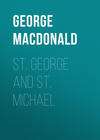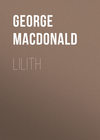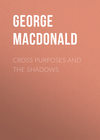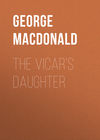Czytaj książkę: «St. George and St. Michael», strona 17
CHAPTER XXIX
THE APPARITION
The voice of her lost Marquis, which even in her dreams she could attribute to none but him, roused Dorothy at once. She sprang from her bed, flew to the window, and flung it wide. That same moment, from the shadows about the hall-door, came forth a man on horseback, and rode along the tiled path to the fountain, where never had hoof of horse before trod. Stranger still, the tramp sounded far away, and woke no echo in the echo-haunted place. A phantom surely—horse and man! As they drew nearer where she stared with wide eyes, the head of the rider rose out of the shadow into the moonlight, and she recognised the face of Richard—very white and still, though not, as she supposed, with the whiteness and stillness of a spectre, but with the concentration of eagerness and watchful resolution. The same moment she recognised Lady. She trembled from head to foot. What could it mean but that beyond a doubt they were both dead, slain in battle, and that Richard had come to pay her a last visit ere he left the world. On they came. Her heart swelled up into her throat, and the effort to queen it over herself, and neither shriek nor drop on the floor, was like struggling to support a falling wall. When the spectre reached the marble fountain, he gave a little start, drew bridle, and seemed to become aware that he had taken a wrong path, looked keenly around him, and instead of continuing his advance towards her window, turned in the direction of the gate. One thing was clear, that whether ghostly or mortal, whether already dead or only on the way to death, the apparition was regardless of her presence. A pang of disappointment shot through her bosom, and for the moment quenched her sense of relief from terror. With it sank the typhoon of her emotion, and she became able to note how draggled and soiled his garments were, how his hair clung about his temples, and that for all accoutrement his mare had but a halter. Yet Richard sat erect and proud, and Lady stepped like a mare full of life and vigour. And there was Marquis, not cowering or howling as dogs do in spectral presence, but madly bounding and barking as if in uncontrollable jubilation!
The acme of her bewilderment was reached when the phantom came under the marquis's study-window, and she heard it call aloud, in a voice which undoubtedly came from corporeal throat, and that throat Richard's, ringing of the morning and the sunrise and the wind that shakes the wheat—anything rather than of the tomb:
'Ho, master Eccles!' it cried; 'when? when? Must my lord's business cool while thou rubbest thy sleepy eyes awake? What, I say! When?—Yes, my lord, I will punctually attend to your lordship's orders. Expect me back within the hour.'
The last words were uttered in a much lower tone, with the respect due to him he seemed addressing, but quite loud enough to be distinctly heard by Eccles or any one else in the court.
Dorothy leaned from her window, and looked sideways to the gate, expecting to see the marquis bending over his window-sill, and talking to Richard. But his window was close shut, nor was there any light behind it.
A minute or two passed, during which she heard the combined discords of the rising portcullis. Then out came Eccles, slow and sleepy.
'By St. George and St. Patrick!' cried Richard, 'why keep'st thou six legs here standing idle? Is thy master's business nothing to thee?'
Eccles looked up at him. He was coming to his senses.
'Thou rides in strange graith on my lord's business,' he said, as he put the key in the lock.
'What is that to thee? Open the gate. And make haste. If it please my lord that I ride thus to escape eyes that else might see further than thine, keen as they are, master Eccles, it is nothing to thee.'
The lock clanged, the gate swung open, and Richard rode through.
By this time a process of doubt and reasoning, rapid as only thought can be, had produced in the mind of Dorothy the conviction that there was something wrong. By what authority was Richard riding from Raglan with muffled hoofs between midnight and morning? His speech to the marquis was plainly a pretence, and doubtless that to Eccles was equally false. To allow him to pass unchallenged would be treason against both her host and her king.
'Eccles! Eccles!' she cried, her voice ringing clear through the court, 'let not that man pass.'
'He gave the word, mistress,' said Eccles, in dull response.
'Stop him, I say,' cried Dorothy again, with energy almost frantic, as she heard the gate swing to heavily. 'Thou shalt be held to account.'
'He gave the word.'
'He's a true man, mistress,' returned Eccles, in tone of self-justification. 'Heard you not my lord marquis give him his last orders from his window?'
'There was no marquis at the window. Stop him, I say.'
'He's gone,' said Eccles quietly, but with waking uneasiness.
'Run after him,' Dorothy almost screamed.
'Stop him at the gate. It is young Heywood of Redware, one of the busiest of the roundheads.'
Eccles was already running and shouting and whistling. She heard his feet resounding from the bridge. With trembling hands she flung a cloak about her, and sped bare-footed down the grand staircase and along the north side of the court to the bell-tower, where she seized the rope of the alarm-bell, and pulled with all her strength. A horrid clangour tore the stillness of the night, re-echoed with yelping response from the multitudinous buildings around. Window after window flew open, head after head was popped out—amongst the first that of the marquis, shouting to know what was amiss. But the question found no answer. The courts began to fill. Some said the castle was on fire; others, that the wild beasts were all out; others, that Waller and Cromwell had scaled the rampart, and were now storming the gates; others, that Eccles had turned traitor and admitted the enemy. In a few moments all was outcry and confusion. Both courts and the great hall were swarming with men and women and children, in every possible stage of attire. The main entrance was crowded with a tumult of soldiery, and scouts were rushing to different stations of outlook, when the cry reached them that the western gate was open, the portcullis up, and the guard gone.
The moment Richard was clear of the portcullis, he set off at a sharp trot for the brick gate, and had almost reached it when he became aware that he was pursued. He had heard the voice of Dorothy as he rode out, and knew to whom he owed it. But yet there was a chance. Rousing the porter with such a noisy reveillee as drowned in his sleepy ears the cries of the warder and those that followed him, he gave the watchword, and the huge key was just turning in the wards when the clang of the alarm-bell suddenly racked the air. The porter stayed his hand, and stood listening.
'Open the gate,' said Richard in authoritative tone.
'I will know first, master,—' began the man.
'Dost not hear the bell?' cried Richard. 'How long wilt thou endanger the castle by thy dulness?'
'I shall know first,' repeated the man deliberately, 'what that bell—'
Ere he could finish the sentence, the butt of Richard's whip had laid him along the threshold of the gate. Richard flung himself from his horse, and turned the key. But his enemies were now close at hand—Eccles and the men of his guard. If the porter had but fallen the other way! Ere he could drag aside his senseless body and open the gate, they were upon him with blows and curses. But the puritan's blood was up, and with the heavy handle of his whip he had felled one and wounded another ere he was himself stretched on the ground with a sword-cut in the head.
CHAPTER XXX
RICHARD AND THE MARQUIS
A very few strokes of the brazen-tongued clamourer had been enough to wake the whole castle. Dorothy flew back to her chamber, and hurrying on her clothes, descended again to the court. It was already in full commotion. The western gate stood open, with the portcullis beyond it high in the wall, and there she took her stand, waiting the return of Eccles and his men.
Presently lord Charles came through the hall from the stone court, and seeing the gate open, called aloud in anger to know what it meant. Receiving no reply, he ran with an oath to drop the portcullis.
'Is there a mutiny amongst the rascals?' he cried.
'There is no cause for dread, my lord,' said Dorothy from the shadow of the gateway.
'How know you that, fair mistress?' returned lord Charles, who knew her voice. 'You must not inspire us with too much of your spare courage. That would be to make us fool-hardy.'
'Indeed, there is nothing to fear, my lord,' persisted Dorothy. 'The warder and his men have but this moment rushed out after one on horseback, whom they had let pass with too little question. They are ten to one,' added Dorothy with a shudder, as the sounds of the fray came up from below.
'If there is then no cause of fear, cousin, why look you so pale?' asked lord Charles, for the gleam of a torch had fallen on Dorothy's face.
'I think I hear them returning, doubtless with a prisoner,' said Dorothy, and stood with her face turned aside, looking anxiously through the gateway and along the bridge. She had obeyed her conscience, and had now to fight her heart, which unreasonable member of the community would insist on hoping that her efforts had been foiled. But in a minute more came the gathering noise of returning footsteps, and presently Lady's head appeared over the crown of the bridge; then rose Eccles, leading her in grim silence; and next came Richard, pale and bleeding, betwixt two men, each holding him by an arm; the rest of the guard crowded behind. As they entered the court, Richard caught sight of Dorothy, and his face shone into a wan smile, to which her rebellious heart responded with a terrible pang.
The voice of lord Charles reached them from the other side of the court.
'Bring the prisoner to the hall,' it cried.
Eccles led the mare away, and the rest took Richard to the hall, which now began to be lighted up, and was soon in a blaze of candles all about the dais. When Dorothy entered, it was crowded with household and garrison, but the marquis, who was tardy at dressing, had not yet appeared. Presently, however, he walked slowly in from the door at the back of the dais, breathing hard, and seated himself heavily in the great chair. Dorothy placed herself near the door, where she could see the prisoner.
Lady Mary entered and seated herself beside her father.
'What meaneth all this tumult?' the marquis began. 'Who rang the alarum-bell?'
'I did, my lord,' answered Dorothy in a trembling voice.
'Thou, mistress Dorothy!' exclaimed the marquis. 'Then I doubt not thou hadst good reason for so doing. Prithee what was the reason? Verily it seems thou wast sent hither to be the guardian of my house!'
'It was not I, my lord, gave the first alarm, but—' She hesitated, then added, 'my poor Marquis.'
'Not so poor for a marquis, cousin Dorothy, as to be called the poorMarquis. Why dost thou call me poor?'
'My lord, I mean my dog.'
'The truth will still lie—between me and thy dog,' said the marquis. 'But come now, instruct me. Who is this prisoner, and how comes he here?'
'He be young Mr. Heywood of Redware, my lord, and a pestilent roundhead,' answered one of his captors.
'Who knows him?'
A moment's silence followed. Then came Dorothy's voice again.
'I do, my lord.'
'Tell me, then, all thou knowest from the beginning, cousin,' said the marquis.
'I was roused by the barking of my dog,' Dorothy began.
'How came HE hither again?'
'My lord, I know not.'
''Tis passing strange. See to it, lord Charles. Go on, mistressDorothy.'
'I heard my dog bark in the court, my lord, and looking from my window saw Mr. Heywood riding through on horseback. Ere I could recover from my astonishment, he had passed the gate, and then I rang the alarm-bell,' said Dorothy briefly.
'Who opened the gate for him?'
'I did, my lord,' said Eccles. 'He made me believe he was talking to your lordship at the study window.'
'Ha! a cunning fox!' said the marquis. 'And then?'
'And then mistress Dorothy fell out upon me—'
'Let thy tongue wag civilly, Eccles.'
'He speaks true, my lord,' said Dorothy. 'I did fall out upon him, for he was but half awake, and I knew not what mischief might be at hand.'
'Eccles is obliged to you, cousin. And so the lady brought you to your senses in time to catch him?'
'Yes, my lord.'
'How comes he wounded? He was but one to a score.'
'My lord, he would else have killed us all.'
'He was armed then?'
Eccles was silent.
'Was he armed?' repeated the marquis.
'He had a heavy whip, my lord.'
'H'm!' said the marquis, and turned to the prisoner.
'Is thy name Heywood, sirrah?' he asked.
'My lord, if you treat me as a clown, you shall have but clown's manners of me; I will not answer.'
''Fore heaven!' exclaimed the marquis, 'our squires would rule the roast.'
'He that doth right, marquis or squire, will one day rule, my lord,' said Richard.
''Tis well said,' returned the marquis. 'I ask your pardon, Mr. Heywood. In times like these a man must be excused for occasionally dropping his manners.'
'Assuredly, my lord, when he stoops to recover them so gracefully as doth the marquis of Worcester.'
'What, then, would'st thou in my house at midnight, Mr. Heywood?' asked the marquis courteously.
'Nothing save mine own, my lord. I came but to look for a stolen mare.'
'What! thou takest Raglan for a den of thieves?'
'I found the mare in your lordship's stable.'
'How then came the mare in my stable?'
'That is not a question for me to answer, my lord.'
'Doubtless thou didst lose her in battle against thy sovereign.'
'She was in Redware stable last night, my lord.'
'Which of you, knaves, stole the gentleman's mare?' cried the marquis.—'But, Mr. Heywood, there can be no theft upon a rebel. He is by nature an outlaw, and his life and goods forfeit to the king.'
'He will hardly yield the point, my lord. So long as Might, the sword, is in the hand of Right, the—'
'Of Right, the roundhead, I suppose you mean,' interrupted the marquis. 'Who carried off Mr. Heywood's mare?' he repeated, rising, and looking abroad on the crowd.
'Tom Fool,' answered a voice from the obscure distance.
A buzz of suppressed laughter followed, which as instantly ceased, for the marquis looked angrily around.
'Stand forth, Tom Fool,' he said.
Through the crowd came Tom, and stood before the dais, looking frightened and sheepish.
'Sure I am, Tom, thou didst never go to steal a mare of thine own notion: who went with thee?' said the marquis.
'Mr. Scudamore, my lord,' answered Tom.
'Ha, Rowland! Art thou there?' cried his lordship.
'I gave him fair warning two years ago, my lord, and the king wants horses,' said Scudamore cunningly.
'Rowland, I like not such warfare. Yet can the roundheads say nought against it, who would filch kingdom from king and church from bishops,' said the marquis, turning again to Heywood.
'As they from the pope, my lord,' rejoined Richard.
'True,' answered the marquis; 'but the bishops are the fairer thieves, and may one day be brought to reason and restitution.'
'As I trust your lordship will in respect of my mare.'
'Nay, that can hardly be. She shall to Gloucester to the king. I would not have sent to Redware to fetch her, but finding thee and her in my house at midnight, it would be plain treason to set such enemies at liberty. What! hast thou fought against his majesty? Thou art scored like an old buckler!'
Richard had started on his adventure very thinly clad, for he had expected to find all possible freedom of muscle necessary, and indeed could not in his buff coat have entered the castle. In the scuffle at the gate, his garment had been torn open, and the eye of the marquis had fallen on the scar of a great wound on his chest, barely healed.
'What age art thou?' he went on, finding Richard made no answer.
'One and twenty, my lord—almost.'
'And what wilt thou be by the time thou art one and thirty, an' I'll let thee go,' said the marquis thoughtfully.
'Dust and ashes, my lord, most likely. Faith, I care not.'
As he spoke he glanced at Dorothy, but she was looking on the ground.
'Nay, nay!' said the marquis feelingly. 'These are, but wild and hurling words for a fine young fellow like thee. Long ere thou be a man, the king will have his own again, and all will be well. Come, promise me thou wilt never more bear arms against his majesty, and I will set thee and thy mare at liberty the moment thou shalt have eaten thy breakfast.'
'Not to save ten lives, my lord, would I give such a promise.'
'Roundhead hypocrite!' cried the marquis, frowning to hide the gleam of satisfaction he felt breaking from his eyes. 'What will thy father say when he hears thou liest deep in Raglan dungeon?'
'He will thank heaven that I lie there a free man instead of walking abroad a slave,' answered Richard.
''Fore heaven!' said the marquis, and was silent for a moment. 'Owest thou then thy king NOTHING, boy?' he resumed.
'I owe the truth everything,' answered Richard.
'The truth!' echoed the marquis.
'Now speaks my lord Worcester like my lord Pilate,' said Richard.
'Hold thy peace, boy,' returned the marquis sternly. 'Thy godly parents have ill taught thee thy manners. How knowest thou what was in my thought when I did but repeat after thee the sacred word thou didst misuse?'
'My lord, I was wrong, and I beg your lordship's pardon. But an' your lordship were standing here with your head half beaten in, and your clothes—'
Here Richard bethought himself, and was silent.
'Tell me then how gat'st thou in, lunatic,' said the marquis, not unkindly, 'and thou shalt straight to bed.'
'My lord,' returned Richard, 'you have taken my mare, and taken my liberty, but the devil is in it if you take my secret.'
'I would thy mare had been poisoned ere she drew thee hither on such a fool's errand! I want neither thee nor thy mare, and yet I may not let you go!'
'A moment more, and it had been an exploit, and no fool's errand, my lord.'
'Then the fool's cap would have been thine, Eccles. How camest thou to let him out? Thou a warder, and ope gate and up portcullis 'twixt waking and sleeping!'
'Had he wanted in, my lord, it would have been different,' said Eccles.'But he only wanted out, and gave the watchword.'
'Where got'st thou the watchword, Mr. Heywood?'
'I will tell thee what I gave for it, my lord. More I will not.'
'What gavest thou then?'
'My word that I would work neither thee nor thine any hurt withal, my lord.'
'Then there are traitors within my gates!' cried the marquis.
'Truly, that I know not, my lord,' answered Richard.
'Prithee tell me how them gat thee into my house, Mr. Heywood? It were but neighbourly.'
'It were but neighbourly, my lord, to hang young Scudamore and Tom Fool for thieves.'
'Tell me how thou gat hold of the watchword, good boy, and I will set thee free, and give thee thy mare again.'
'I will not, my lord.'
'Then the devil take thee!' said the marquis, rising.
The same moment Richard reeled, and but for the men about him, would have fallen heavily.
Dorothy darted forward, but could not come near him for the crowd.
'My lord Charles,' cried the marquis, 'see the poor fellow taken care of. Let him sleep, and perchance on the morrow he will listen to reason. Mistress Watson will see to his hurts. I would to God he were on our side! I like him well.'
The men took him up and followed lord Charles to the housekeeper's apartment, where they laid him on a bed in a little turret, and left him, still insensible, to her care, with injunctions to turn the key in the lock if she went from the chamber but for a moment. 'For who can tell,' thought lord Charles, greatly perplexed, 'but as he came he may go?'
Some of the household had followed them, and several of the women would gladly have stayed, but Mrs. Watson sent all away. Gradually the crowd dispersed. The tumult ceased; the household retired. The castle grew still, and most of its inhabitants fell asleep again.
'A damned hot-livered roundhead coxcomb!' said lord Worcester to himself, pacing his room. 'These pelting cockerel squires and yeomen nowadays go strutting and crowing as if all the yard were theirs! We shall see how far this heat will carry the rogue! I doubt not the boy would tell everything than see his mare whipped. He's a fine fellow, and it were a thousand pities he turned coward and gave in. But the affair is not mine; it is the king's majesty's. Would to God the rascal were of our side! He's the right old English breed. A few such were very welcome, if only to show some of our dainty young lordlings of yesterday what breed can do. But an ass-foal it is! To run his neck into a halter, and set honest people in mortal doubt whether to pull the end or no!
How on earth did he ever dream of carrying off a horse out of the very courts of Raglan castle! And yet, by saint George! he would have done it too, but for that brave wench of a Vaughan! What a couple the two would make! They'd give us a race of Arthurs and Orlandos between them. God be praised there are such left in England! And yet the rogue is but a pestilent roundhead—the more's the pity! Those coward rascals need never have mauled him like that. Yet had the blow gone a little deeper it had been a mighty gain to our side. Out he shall not go till the war be over! It would be downright treason.'
So ran the thoughts of the marquis as he paced his chamber. But at length he lay down once more, and sought refuge in sleep.




















